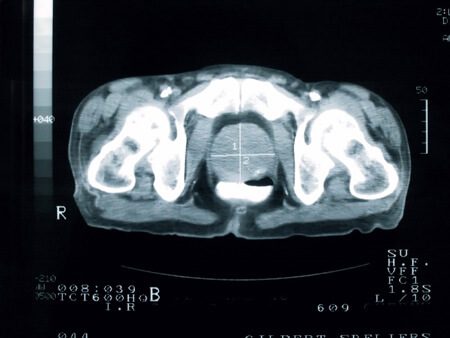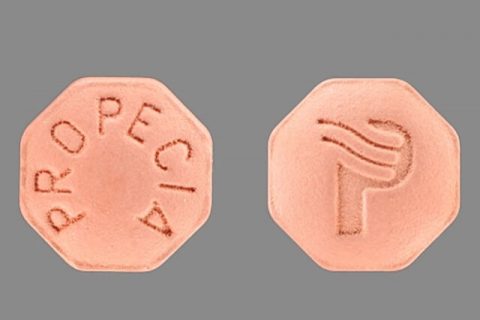
Propecia Side Effects
Propecia’s active ingredient, finasteride, effectively blocks the hormone responsible for male pattern baldness, a common genetic form of hair loss. However, numerous studies suggest that the hair-restoration drug can also have damaging effects on a man’s sexual health, including decreased sex drive, erectile problems and a decreased volume of ejaculation.
The most frequently reported adverse reactions to Propecia (finasteride) affect men’s sexual health. No clear causal links between use of the hair-growth drug and sexual side effects have been established. But finasteride suppresses the hormone dihydrotestosterone (DHT), which plays a major role in sexuality and sexual development, making the connection highly plausible.
Lowering the body’s levels of DHT may correct hair loss, but problems arise because the sex hormone is also important for maintaining the structural integrity of nerves, smooth muscle, connective tissue and signaling pathways in the penis.
Side effects of Propecia (finasteride) include:
- Erectile dysfunction
- Decreased libido
- Ejaculatory disorder
- Swelling in face, arms, hands, legs, or feet
- Breast tenderness or swelling
- Male breast cancer
- Dizziness
- Headache
- Skin rash or hives
- Weakness
In clinical trials, 1 percent or more of men who took Propecia suffered erectile dysfunction, decreased libido and/or ejaculatory disorder. Additional studies showed these side effects persisted in men even after they stopped taking the drug.
The U.S. Food and Drug Administration requires the drug’s maker, Merck & Co., to warn users that these side effects have occurred and that they haven’t always gone away when the drug was discontinued.
Erectile Dysfunction
Erectile dysfunction (ED) is when a man has trouble getting or keeping an erection. It becomes more common as men get older, though it is not considered a natural part of aging.
It is also a side effect that repeatedly appears in finasteride studies, including double-blind, randomized and placebo-controlled trials, which are the gold standard for medical studies.
The PROSPECT study was one of those trials. A total of 472 healthy men aged 45 to 80 received either finasteride or a placebo for two years.
The rate of sexual dysfunction was “significantly higher” in men who took finasteride compared to men who took the placebo, according to the study’s authors.
Impotence occurred in 15.8 percent of finasteride users while 6.3 percent of placebo users reported the issue. The study’s authors published the results in the November 1996 issue of Canadian Medical Association Journal.
Also in 1996, a much larger observational cohort study published in British Journal of Urology used prescription-event monitoring to gather information on 14,772 patients. ED was the most frequently reported side effect with finasteride. It was also the most common reason for stopping the medication.
Persistent Erectile Dysfunction
In March 2017, a Northwestern Medicine study found that some men who took finasteride suffered persistent erectile dysfunction in which they were not able to have normal erections for months or years after stopping the medication.
Out of 11,909 men who took finasteride or dutasteride, 1.4 percent developed persistent erectile dysfunction that continued for an average of about 1,350 days after stopping treatment, according to the study. Young men who had more than 205 days of exposure to the drug had nearly five times higher risk of persistent erectile dysfunction than men with shorter exposure.
Researchers published their findings in the open access journal PeerJ.
Loss of Libido
Another side effect reported with Propecia use is a reduced interest in sex. In fact, loss of libido was the most common sexual side effect reported in a 2011 study of finasteride users published in the Journal of Sexual Medicine.
Researchers from the George Washington University School of Medicine interviewed 71 patients who experienced sexual side effects after using finasteride. The researchers found that 94 percent of men experienced a decline in libido.
“Such significant and undesirable complications in relation to sexual function produce a well-documented negative impact on quality of life.”
However, the rate at which decreased libido occurred varies from study to study.
According to a meta-analysis conducted by the American Urological Association Benign Prostatic Hyperplasia (BPH) guidelines committee, the rate of decreased libido was 5 percent in men taking finasteride, compared with 3 percent in men given a placebo.
A 2003 review in the International Journal of Impotence Research found loss of libido was reported in 3.1 to 5.4 percent of patients who took finasteride. And a 2016 review in The Journal of Clinical and Aesthetic Dermatology found 2.36 to 10 percent of men on the drug reported the side effect compared to 0.5 percent to 1.7 percent of men on a placebo.
“Such significant and undesirable complications in relation to sexual function produce a well-documented negative impact on quality of life,” the authors of the 2003 review wrote. “Thus, optimal treatment for men with BPH requires the use of agents that demonstrate efficacy and safety with fewer sexual side effects.”
Ejaculatory Disorder
Propecia use also has been associated with several ejaculatory disorders. Ejaculatory disorders range from premature (rapid) ejaculation to delayed ejaculation to a complete inability to ejaculate.
A 2002 review of randomized finasteride trials found more men who took the drug reported ejaculation disorder than did men who took a placebo. The research article in BMC Urology looked at five double-blind, placebo-controlled trials lasting 12 months. The authors calculated the relative risk for ejaculation disorder was 3.6 percent for men taking finasteride.
The PROSPECT study also found a significant increase in ejaculatory disorders among finasteride users. The incidence was 7.7 percent for men who took the medication compared to 1.7 percent among men who received a placebo.
Meanwhile, the 2003 review in the International Journal of Impotence Research found between 2.1 and 7.7 percent of men taking the drug in studies reported ejaculatory disorders.
Ejaculatory disorders associated with Propecia use include:
- Retrograde ejaculation (when semen goes backward into the bladder rather than forward out of the penis)
- Ejaculation failure
- Decrease in semen volume
Studies Dating Back to 1992 Reveal Side Effects
Five years before the FDA approved Propecia to treat male pattern baldness, researchers linked doses of finasteride to sexual side effects. According to a 1992 report in the New England Journal of Medicine, researchers found a higher incidence of impotence, ejaculatory disorders and decreased libido in finasteride users when compared with men who took a placebo.
The study was published just four months after the FDA approved finasteride under the brand name Proscar to treat enlarged prostates. The side effects weren’t given much thought because most of the men in studies were older with enlarged prostates, making them more prone to underlying sexual dysfunction.
But when Merck introduced Propecia for hair-loss treatment in 1997, younger men — who were much less likely to have sexual dysfunction — began taking finasteride and concern of potential sexual side effects grew.
In 1998 researchers published findings from two year-long trials on the drug. More than 1,500 men between the ages of 18 and 41 participated in the trials in which they received either Propecia or a placebo.
Researchers discovered 4.2 percent of men treated with Propecia reported sexual dysfunction, compared with 2.2 percent of men given a placebo. Their work was published in the Journal of the American Academy of Dermatology.
“Because this trial was designed to study the hair-restoring qualities of finasteride, and the assessment of sexual side effects does not appear to have been rigorously conducted, the extent of the side effects may very well have been underreported,” Dr. Daniel Marchalik, an urologist at the MedStar Washington Hospital Center in D.C., wrote in The Washington Post.
Problems Continue After Drug Use Stops
Following the early drug trials, both Merck and the FDA assured men that the sexual complications would resolve once they stopped taking the drug, but later evidence would prove the contrary.
The preapproval trials were not especially reliable, as the information was drawn from a relatively small patient group treated for only six months to one year, and follow-up procedures were unclear.
More recent investigations show the drug’s sexual side effects can persist even after a man stops taking the drug. In some cases, the complications are irreversible.
In 2010, researchers at Boston University School of Medicine published a case study of a 24-year-old man who started taking Propecia in 1999. Within one week of starting treatment, the man experienced soreness in his testicles, a lack of sex drive and the inability to achieve an erection.
The man stopped taking the drug about a month later, and while some side effects disappeared, his sexual function never returned to normal. In a follow-up 11 years later, he still suffered from erectile dysfunction and loss of libido. The researchers published their study in the Journal of Sexual Medicine.
In 2011, George Washington University urologist Michael S. Irwig and his colleague Swapna Kolukula published their assessment of 71 finasteride patients who reported long-term sexual side effects that persisted after discontinuation of the drug.
The selected group of patients (young men between the ages of 21 and 46) took a survey that revealed a wide range of sexual side effects that arose after Propecia use, including problems with erectile function, arousal, sexual desire, orgasm and orgasm satisfaction.
The men had taken the drug for an average of 28 months. The sexual side effects continued for an average of 40 months after the men stopped taking the drug.
Upon following up with 54 of these patients one year later, Irwig discovered that 96 percent of the men were still suffering from the sexual dysfunctions they initially reported. None of the men reported sexual, psychiatric or medical complaints before taking finasteride.
“The argument that the benefits of these drugs outweigh the risks is slowly eroding in the face of new emerging scientific evidence from preclinical and clinical studies.”
A 2014 review in Korean Journal of Urology found at least four previous studies that reported “persistent or irreversible” sexual side effects. The authors said the studies reported “negative emotional toll and reduced quality of life” for the men affected.
“The argument that the benefits of these drugs outweigh the risks is slowly eroding in the face of new emerging scientific evidence from preclinical and clinical studies,” the authors wrote.
Men who suffered long-term sexual dysfunction after taking Propecia have filed lawsuits against Merck that accuse the company of failing to warn users of the risk.
Sexual Dysfunction and Suicidal Thoughts
Researchers have also found an increased risk of depressive symptoms and suicidal thoughts among men who suffered sexual side effects of Propecia. Irwig reported the connection in a 2012 study in the Journal of Clinical Psychiatry.
Irwig looked at 61 former finasteride users who experienced sexual dysfunction for three months or longer after they quit the medication. He compared them to a control group of 29 men who had male pattern hair loss but who had never used the drug.
He found that 44 percent of the former Propecia patients experienced suicidal thoughts compared to just 3 percent of men who never used the medication.
The rate of depressive symptoms was 75 percent in the men who had used finasteride and 10 percent in the control group. Sixty-four percent of the former finasteride users suffered moderate or severe depressive symptoms. None of the men in the control group experienced the same issues.
A July 2015 study in Pharmacotherapy also found increased risk of suicidal thoughts among men taking the medication. In this study, researchers relied on adverse events reported to the FDA. They looked at reports filed between 1998 and 2013 and narrowed the field to reports involving 18- to 45- year-old men.
Researchers looked for men who used low-dose finasteride and reported both sexual dysfunction and suicidal ideation. Out of 4,910 reports, they found 577 patients who reported persistent sexual side effects and 39 men who reported suicidal thoughts.
Of the 39 who reported suicidal thoughts, 87.2 percent also reported sexual dysfunction. Six of the sexual dysfunction reports included patient deaths.
In 2022, the FDA rejected a request to remove Propecia from the market. However, the agency will require the Merck spinoff company Organon to add warnings for suicidal ideation and behavior to the label.
FDA Warns of Additional Problems and Risks
When evidence conflicted with Merck’s original assertion that the sexual side effects of Propecia would stop once treatment ends, the FDA required the manufacturer to revise the drug’s safety label accordingly.
In 2011, the FDA called for a warning that erectile dysfunction may continue after the drug is no longer being used.
The following year, the agency published results from an investigation into the adverse effects of finasteride. Using data collected from 1998 to 2011, the agency identified persistent sexual dysfunction of at least three months in 14 percent of the 421 evaluated cases.
After the April 2012 investigation, the FDA required Merck to change Propecia’s label to include reports of libido, ejaculation and orgasm disorders that continued even after men stopped taking the drug. The label says 1 percent or more of men who used the drug experienced one or more of these three side effects.
The FDA also ordered Merck to add information about reports of male infertility and poor semen quality. The label description included information that the fertility and semen issues improved or returned to normal after men quit taking the drug.
Risks Involving Women, Children & Pregnancy
The FDA warns that Propecia is not approved for use in women and children. If a pregnant woman receives finasteride, the drug may cause abnormalities of the external genitalia of a male fetus, according to the agency. This is because finasteride suppresses DHT, and the hormone is necessary for normal development of male genitalia.
“Women should not handle crushed or broken Propecia tablets when they are pregnant or when they may potentially be pregnant because of potential risk to a male fetus,” Propecia’s label reads.
In female rats, low doses of finasteride administered during pregnancy have produced abnormalities of the external genitalia in male offspring, including decreased prostatic and seminal vesicular weights, delayed preputial separation and transient nipple development.
“Women should not handle crushed or broken Propecia tablets when they are pregnant or may potentially be pregnant due to potential risk to a male fetus.”
Prostate Cancer and Male Breast Cancer Warnings
In April 2011, Merck updated the adverse events section of Propecia’s label to include male breast cancer. According to the update, the side effect is rare. Still, the label advises men who use the drug to let their doctor know right away if they notice changes to their breasts such as lumps, pain or nipple discharge.
The drug also carries a warning that men 55 and older who take finasteride may have an increased risk of developing high-grade prostate cancer, the deadliest form of prostate cancer. The warning is based on the dose to treat enlarged prostate, which is five times higher than the dose used for hair loss.

Evidence of the increased risk comes from two large clinical trials: the seven-year Prostate Cancer Prevention Trial (PCPT) and the four-year Reduction by Dutasteride of Prostate Cancer Events (REDUCE) trial.
Both trials sought to determine if finasteride could be used to lower the risk of prostate cancer. PCPT and REDUCE revealed decreased incidences of lower-risk forms of prostate cancer in men who took the drug. However, finasteride users in both trials were found to be at a greater risk for high-grade prostate cancer.
High-grade prostate cancer is highly aggressive and grows rapidly, often spreading to other areas like the lymph nodes and bones. Further, high-grade prostate cancer cells are large, difficult to treat and reappear more frequently than low- and intermediate-grade prostate cancers.
The FDA released a safety announcement in 2011 to inform doctors and patients about revisions to the drug’s label to reflect the cancer risk.
Calling this number connects you with a Drugwatch representative. We will direct you to one of our trusted legal partners for a free case review.
Drugwatch's trusted legal partners support the organization's mission to keep people safe from dangerous drugs and medical devices. For more information, visit our partners page.





